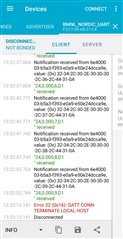I am using a ultra-miniature (BMD-350) series module from Rigdo which has the nRF52832 BLE SoC. The pins from the nrf52 SoC are all brought out on a female headers on a custom PCB.
Firmware/SDK configuration:
- nRF5_SDK_15.3.0_59ac345 SDK
- pca10040 and softdevice s132
- nrf52832_xxaa
Debugger
- J-Link EDU Mini debug module and using Segger Ozone software for debugging.
nrf Android Apps:
- nrFConnect, nrF Logger and nrfUART app
I have modified the ble_app_uart example and attached the zip file of modified code.
In the main.c file, I modified the function nus_data_handler to send dummy packets(appx. 24 bytes per packet) to the nrfUART app by calling the function ble_nus_data_send periodically 5 seconds over BLE NUS to nrfUART app inside a loop over 500 times. Below is the code snippet:
/**@snippet [Handling the data received over BLE] */
static void nus_data_handler(ble_nus_evt_t * p_evt)
{
// uint8_t rx_byte;
NRF_LOG_INFO("[%d]nus_data_handler", order++);
if (p_evt->type == BLE_NUS_EVT_RX_DATA)
{
NRF_LOG_INFO("[%d]nus_data_handler: evt=BLE_NUS_EVT_RX_DATA", order++);
uint32_t err_code;
NRF_LOG_DEBUG("Received data from BLE NUS. Writing data on UART.");
NRF_LOG_HEXDUMP_DEBUG(p_evt->params.rx_data.p_data, p_evt->params.rx_data.length);
for (uint32_t i = 0; i < p_evt->params.rx_data.length; i++)
{
do
{
err_code = app_uart_put(p_evt->params.rx_data.p_data[i]);
if ((err_code != NRF_SUCCESS) && (err_code != NRF_ERROR_BUSY))
{
NRF_LOG_ERROR("Failed receiving NUS message. Error 0x%x. ", err_code);
APP_ERROR_CHECK(err_code);
}
} while (err_code == NRF_ERROR_BUSY);
// nrf_delay_ms(10);
//
// err_code = app_uart_get(&rx_byte);
// if( ( rx_byte != p_evt->params.rx_data.p_data[i] ) && err_code != NRF_SUCCESS )
// {
// NRF_LOG_ERROR("Failed to Loopback character 0x%x. Error: 0x%x",
// p_evt->params.rx_data.p_data[i],
// err_code );
// }
}
if (p_evt->params.rx_data.p_data[p_evt->params.rx_data.length - 1] == '\r')
{
while (app_uart_put('\n') == NRF_ERROR_BUSY);
// nrf_delay_ms(10);
//
// err_code = app_uart_get(&rx_byte);
//
// if( ( rx_byte != p_evt->params.rx_data.p_data[p_evt->params.rx_data.length - 1] ) && err_code != NRF_SUCCESS )
// {
// NRF_LOG_ERROR("Failed to Loopback character 0x%x. Error: 0x%x",
// p_evt->params.rx_data.p_data[p_evt->params.rx_data.length - 1],
// err_code );
// }
}
}
NRF_LOG_DEBUG("Received string %s", p_evt->params.rx_data.p_data);
NRF_LOG_HEXDUMP_DEBUG(p_evt->params.rx_data.p_data, p_evt->params.rx_data.length);
// If Data Received is "Requesting Data", then start sending data in a loop
// char const * expected_str = "Requesting Data";
// if( 0 == strncmp( (char*)(p_evt->params.rx_data.p_data), expected_str, strlen(expected_str) ) )
{
NRF_LOG_DEBUG("Ready to send sensor data over BLE NUS");
uint32_t err_code;
//char * data = "24, 0.000, 0.000, 1, D1\n";
char data_buffer[BLE_NUS_MAX_DATA_LEN];
// srand (time(NULL));
// float x;
for( int i = 0; i <500; i++)
{
// x = ((float)rand()/(float)(RAND_MAX)) * 0.9999;
// sprintf(data_buffer, "24,%.2f,%d,D1\n",x, i+1);
sprintf(data_buffer, "24,0.000,%d,D1\n", i+1);
uint16_t length = strlen(data_buffer);
NRF_LOG_DEBUG("Sending over BLE. Data length: %d, Data: %s", length, data_buffer);
do
{
err_code = ble_nus_data_send(&m_nus, (uint8_t*)data_buffer, &length, m_conn_handle);
if ((err_code != NRF_ERROR_INVALID_STATE) &&
(err_code != NRF_ERROR_RESOURCES) &&
(err_code != NRF_ERROR_NOT_FOUND))
{
APP_ERROR_CHECK(err_code);
}
} while (err_code == NRF_ERROR_RESOURCES);
nrf_delay_ms(5000);
}
}
// else
// {
// NRF_LOG_DEBUG("Not received required string!");
// }
}
/**@snippet [Handling the data received over BLE] */
While I do receive first 12 packets on nRFUART app but thereafter I stop receiving anything even though I should continue to receive remaining 489 of 500 dummy packets. The Bluetooth connection also gets disconnected and I dont see the nrf52 advertising. Thereafter, I have to reset my nRF52 to make new Bluetooth connection and restart this process.
I have tried manipulating buffer sizes used by ble_nus_data_send as well as UARt bufffers, but nothing seems to work. Either I get run-time error or issue remains.
What is the proper way to send streaming data packets to the nrfUART from nrf52 continuously using the BLE UART service ?



